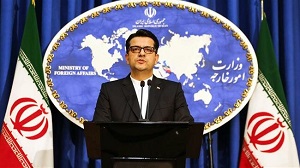Tehran says it is not after fueling tensions and keeps the door open to diplomacy and talks despite Europe’s failure to stand up to US pressure and uphold its commitments under a 2015 nuclear deal.
Iran’s Foreign Ministry spokesman Abbas Mousavi said on Wednesday that the country remains committed to the 2015 nuclear deal, officially known as the Joint Comprehensive Plan of Action (JCPOA), but at the same time, defends the nation’s rights.
“Although Iran is pursuing this strategy, we have not closed the door to diplomacy and the door is open to talks,” he added.
The remarks came as Emmanuel Bonne, French President Emmanuel Macron’s top diplomatic adviser, is in Tehran to hold talks with Iranian officials in a bid to salvage the JCPOA and de-escalate the tensions, which broke out in the aftermath of the US’s unilateral withdrawal last year from the accord and re-imposition of harsh economic sanctions against the Islamic Republic, Press TV reported.
Iran initially said it would stay in the deal if the other signatories — France, Britain, Germany, Russia and China — manage to fill in for the United States and offset Washington’s anti-Iran sanctions.
A year later, after the European sides failed to fulfill their end of the bargain, Iran suspended the implementation of some of its commitments under the deal to hurry the Europeans into meeting Iran’s legal demands under the deal.
Elsewhere in his remarks, Mousavi stressed that Tehran was not seeking to fan the flames of tensions, and that the European countries should address “the root cause of the tensions” if they really seek to calm the situation.
“The illegal and unilateral withdrawal from the nuclear agreement followed by extensive sanctions — which they (the Americans) call crippling and backbreaking — are examples of the Unites States’ measures against the Iranian nation, which we consider as nothing but economic terrorism and economic war,” he said.
Mousavi also welcomed France’s efforts to keep the Iran deal in place, but said such efforts are part of Paris’ obligations as a party to the JCPOA.
Bonne is set to hold talks with Iranian Foreign Minister Mohammad Javad Zarif and Secretary of Supreme National Security Council (SNSC) Ali Shamkhani during his stay in Tehran as the Europeans speed up efforts towards saving the Iran deal.
In line with the same efforts, German Foreign Minister Heiko Maas also paid a visit to Tehran in June.
In a statement released on Tuesday, the foreign ministers of France, Germany and Britain, plus the EU’s foreign policy chief, called for an urgent meeting of the JCPOA Joint Commission for resolving disputes under the agreement.
“These compliance issues must be addressed within the framework of the JCPOA, and a Joint Commission should be convened urgently,” read the statement.
Mousavi further commented on an upcoming US-requested emergency meeting of the International Atomic Energy Agency (IAEA)’s 35-nation Board of Governors on Iran, criticizing it as “a bitter irony” as Washington had itself blatantly violated the JCPOA.
The event, however, provides Iran with a good opportunity to outline violations of the JCPOA by the Americans and the Europeans, themselves.
Separately, Foreign Minister Mohammad Javad Zarif referred to Iran’s retaliatory measures in the face of Washington’s exit, emphasized that Iran was exercising its right under the JCPOA, but the opposite side was violating the deal.
He said it was up to the European cosignatories to resolve the issues caused by Washington’s pullout.
“The problem is the Europeans themselves as they lack the readiness to pay the price for their own security. Their major problem is the US, which has withdrawn from the JCPOA. They (the Europeans) should step forward and resolve this problem,” he told reporters on the sidelines of a cabinet meeting.
The top Iranian diplomat further rejected the possibility of negotiations under pressure, saying, “Pressure, economic war and economic terrorism should stop against the Iranian nation, then we will hold talks about the JCPOA.”
M.Wassouf

